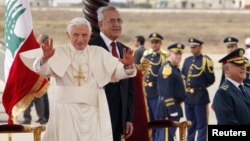BEIRUT —
Pope Benedict has arrived in Lebanon on a three-day visit aimed at promoting peace in this turbulent nation bordering both Syria and Israel. He is the first pope to travel to Beirut in 15 years, and his trip comes at a time of rising tensions among Christians in many parts of the Middle East.
Hundreds of people and heavy security greeted the pope's arrival at the capital's Rafik Hariri international airport. He asked for prayers and efforts to deepen the dialogue between Christians and what he called “followers of other religions.”
Lebanon has been preparing for the papal visit for months. Main highways are decorated with Vatican flags and billboards welcoming the pope.
Christians like Nabil Braidy are celebrating what they call a momentous occasion. "The pope’s visit is important, and it’s kind of a victory for Christians as well as Muslims," said Braidy.
Pascal Sakr, another Lebanese Christian, hopes the pope's visit will promote peace. It’s good to have this visit now, at this moment, because of the situation in the region. This visit will give us support and peace for Lebanon and the Orient,” Sakr stated.
This is a turbulent time for Christians in this part of the Middle East. Lebanon is undergoing a period of relative peace after years of civil war, and Christians say they feel secure here, but they are concerned about spillover from the civil war in Syria, which has had a powerful influence on Lebanon for decades.
More than 1,330 Syrian Christian refugees have fled to Lebanon, says Archbishop Issam John Darwich of Zahle, a Christian stronghold.
“We are really afraid that the same event that’s happening in Syria will happen in Lebanon, and everywhere in the Arabic country," he said.
Still, Lebanese Christians are divided politically over the conflict in Syria. Amin Ammourieh, a columnist with the An Nahar newspaper, says some of this derives from political divisions here between Sunni and Shi'ite Muslims.
“Most of the Sunnah [Sunnis] are against the Syrian government and most of the Shias are with the Syrian government, so the Sunnah are united, the Shias are united, but the Christians are divided," he explained. "And that is the reason why they are weak in politics.”
There are an estimated 13 million Catholics in the Middle East. Paul Salem, director of the Carnegie Middle East Center, says the pope will work toward allaying their concerns about rising Islamic fundamentalism, and plead with them not to flee their homelands.
“The Christians have always played a key seminal role in this culture, in this civilization from the time of the advent of Islam in the seventh century onward," Salem stated. "They are part of this history, this civilization. They should not alienate themselves from it.”
The 85-year-old pontiff will meet with Muslim leaders and politicians and also visit the pilgrimage site of Our Lady of Lebanon in Harissa. His visit will conclude Sunday after a public Mass near the Beirut waterfront.
Hundreds of people and heavy security greeted the pope's arrival at the capital's Rafik Hariri international airport. He asked for prayers and efforts to deepen the dialogue between Christians and what he called “followers of other religions.”
Lebanon has been preparing for the papal visit for months. Main highways are decorated with Vatican flags and billboards welcoming the pope.
Christians like Nabil Braidy are celebrating what they call a momentous occasion. "The pope’s visit is important, and it’s kind of a victory for Christians as well as Muslims," said Braidy.
Pascal Sakr, another Lebanese Christian, hopes the pope's visit will promote peace. It’s good to have this visit now, at this moment, because of the situation in the region. This visit will give us support and peace for Lebanon and the Orient,” Sakr stated.
This is a turbulent time for Christians in this part of the Middle East. Lebanon is undergoing a period of relative peace after years of civil war, and Christians say they feel secure here, but they are concerned about spillover from the civil war in Syria, which has had a powerful influence on Lebanon for decades.
More than 1,330 Syrian Christian refugees have fled to Lebanon, says Archbishop Issam John Darwich of Zahle, a Christian stronghold.
“We are really afraid that the same event that’s happening in Syria will happen in Lebanon, and everywhere in the Arabic country," he said.
Still, Lebanese Christians are divided politically over the conflict in Syria. Amin Ammourieh, a columnist with the An Nahar newspaper, says some of this derives from political divisions here between Sunni and Shi'ite Muslims.
“Most of the Sunnah [Sunnis] are against the Syrian government and most of the Shias are with the Syrian government, so the Sunnah are united, the Shias are united, but the Christians are divided," he explained. "And that is the reason why they are weak in politics.”
There are an estimated 13 million Catholics in the Middle East. Paul Salem, director of the Carnegie Middle East Center, says the pope will work toward allaying their concerns about rising Islamic fundamentalism, and plead with them not to flee their homelands.
“The Christians have always played a key seminal role in this culture, in this civilization from the time of the advent of Islam in the seventh century onward," Salem stated. "They are part of this history, this civilization. They should not alienate themselves from it.”
The 85-year-old pontiff will meet with Muslim leaders and politicians and also visit the pilgrimage site of Our Lady of Lebanon in Harissa. His visit will conclude Sunday after a public Mass near the Beirut waterfront.




